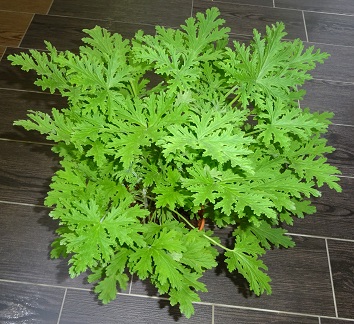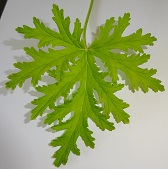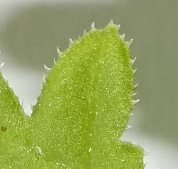| Home | Nature Weekly Index |
13 December 2015 | Mosquito Plant | Pelargonium 'Citrosum' |
 Some people believe that the Mosquito Plant repels mosquitoes. Experiments done [1, 2] about 20 years back had failed to support
this claim. In addition, the botanical name Pelargonium citrosum used on this plant was also questionable. Many posts in the Internet said the
American Botanical Council indicated that Pelargonium citrosum is not a valid taxonomic designation. However, I was
not able to find the original reference from this Council. Furthermore, the American Botanical Council deals with herbal medicine
and may not be an authoritative source on botanical names. Other had mentioned that it might be a cultivar or a hybrid of
Pelargonium citronellum (Lemon Geranium)
Some people believe that the Mosquito Plant repels mosquitoes. Experiments done [1, 2] about 20 years back had failed to support
this claim. In addition, the botanical name Pelargonium citrosum used on this plant was also questionable. Many posts in the Internet said the
American Botanical Council indicated that Pelargonium citrosum is not a valid taxonomic designation. However, I was
not able to find the original reference from this Council. Furthermore, the American Botanical Council deals with herbal medicine
and may not be an authoritative source on botanical names. Other had mentioned that it might be a cultivar or a hybrid of
Pelargonium citronellum (Lemon Geranium)

 While looking up for information on this plant, I came across a recent
publication in 2012 from Malaysia that tested the anti-dengue
activity from the extracts of 5 medicinal plants. Pelargonium citrosum happened to be one of them. The article stated that
the "botanical identities of each plant were determined and authenticated by taxonomist" from a University in Malaysia. This was
probably one of the very few taxonomist (if any) who recognised Pelargonium citrosum as a valid botanical name. As for the
results from the study, extracts from Pelargonium citrosum did not show any anti-dengue activity. In fact, the plant also did
not make it in another experiment back in 2006, also done in
Malaysia, when 30 plant species were compared on their mosquitocidal activities.
While looking up for information on this plant, I came across a recent
publication in 2012 from Malaysia that tested the anti-dengue
activity from the extracts of 5 medicinal plants. Pelargonium citrosum happened to be one of them. The article stated that
the "botanical identities of each plant were determined and authenticated by taxonomist" from a University in Malaysia. This was
probably one of the very few taxonomist (if any) who recognised Pelargonium citrosum as a valid botanical name. As for the
results from the study, extracts from Pelargonium citrosum did not show any anti-dengue activity. In fact, the plant also did
not make it in another experiment back in 2006, also done in
Malaysia, when 30 plant species were compared on their mosquitocidal activities.
The plant itself emits a faint citronella scent, similar to that from the Cymbopogon citratus (Lemon Grass). The scent is slightly stronger when you rub your fingers against the leaves. The familiar scent led to the belief in the claim that it was an engineered plant where genes from a grass (Cymbopogon species) that emit this scent were incorporated in an African lemon geranium. For more stories and mystery surrounding the identity and origin of this plant, you can read the post at the Mosquito Reviews website.
In Singapore, the 2009 Flora Checklist only listed Pelargonium graveolens (Rose Geranium). The original Pelargonium graveolens is supposed to have a rose-scented smell. I had been using the name Pelargonium citrosum in the past. As of this post, I had decided to use Pelargonium graveolens instead.
Last month, I decided to bring a pot home, not so much on its anti-mosquito legend, but to have a closer look at it over time. I might share more on this plant if I were to learn more interesting things from it later.
References:
[1] Matsuda BM, Surgeoner GA, Heal JD, Tucker AO, Maciarello MJ. Essential oil analysis and field evaluation of the citrosa plant "Pelargonium citrosum" as a repellent against populations of Aedes mosquitos. J American Mosquito Control Association 1996;12(1):69-74. | Abstract |
[2] Cilek JE, Schreiber ET. Failure of the "mosquito plant", Pelargonium x citrosum 'van Leenii', to repel adult Aedes albopictus and Culex quinquefasciatus in Florida. J American Mosquito Control Association 1994;10(4):473-476. | Abstract |